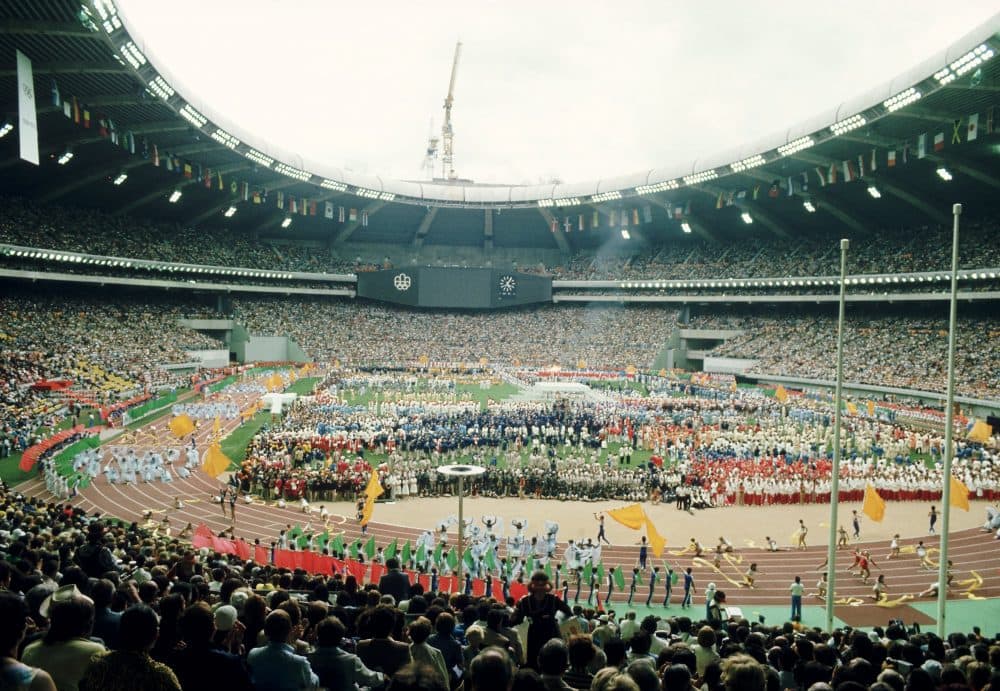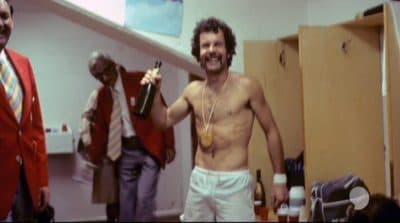Advertisement
Waiting For Their Gold Medals...Since 1976

When we were growing up, there was one phrase that never got us very far. Maybe my brothers would be arguing over a game of Trivial Pursuit. Or maybe I'd be mad because my little sister had gotten a cute pair of new shoes, and the store didn't have any in my size.
One of us kids would always yell, "It's not fair!" And my dad would sigh, get this look on his face and say, "Life is not fair."
It worked. I mean, how do you argue against, "Life is not fair?"
But here's the thing. Don't ever try to end an argument that way when you're talking to someone from New Zealand.
"Life is not fair, as it turns out, but that’s why there are New Zealanders, because we will work hard to make sure it is fair," journalist Heather du Plessis-Allan said. "Fairness in New Zealand is so important. It’s one of the things that we get worked up about all of the time. And they may be the rules, but they are not fair."
Montreal, 1976
Heather hosts a television show called Story. And the rules that she's talking about relate to team sports and Olympic medals. Specifically which members of a team are given medals during the Olympics. And even more specifically, which members of the 1976 New Zealand men's field hockey team were awarded medals after winning gold in Montreal.
That the team was on the medal stand at all was a big surprise.
"None of our hockey teams are good enough ever, really, to medal," Heather said. "And that was part of the problem was that they had never ever gotten to the medaling stage, so none of them knew the team rules."
There were a couple of rules at play here. First, there were the rules regarding substitutions.
"Back in 1976, you would have three or four subs, and you could only sub twice during a game. So, you’d be sparing with who you’d bring onto the field," Heather said.
Advertisement
But there was another rule — and this one was unique to the Olympics. Only athletes who actually played in a game would get medals.
"When they finally did get to the point at which the managers and the coaches were made aware, it was far too late, and the games were too tight, and they couldn’t spare any of their players coming off," Heather said.
The International Olympic Committee would reverse that rule in 2004. Now all the members of the winning teams get medals.
If New Zealand had ever held a commanding lead in that gold medal game, they could have done what other teams did — send in their bench players just for the last minute or two. But this game was just too close, right up until the end.
As the team celebrated their victory on the field, the coaches knew Les Wilson and Neil McLeod wouldn't be getting medals. Les Wilson and Neil McLeod knew they wouldn't be getting medals. But nobody else did.
"They kept it from rest of the team and, in a way, keeping that information from the squad ruined their experience on the dais," Heather said.
Sixteen players' names were on the roster. Sixteen players had practiced. Sixteen players had paid their own way to Montreal. But the old film shows 14 proud — and rather confused — New Zealanders, wondering why two of their teammates weren't with them.
"Rather than enjoying this amazing moment, a once-in-a-lifetime moment, they just felt incredibly bad for their two team members standing on the side," Heather said.

Back in the locker room, the team celebrated. They laughed and they smiled — there are photographs to prove it.
Neil McLeod had just one request.
"He asked to hold the medal of another player, Arthur Parkin. And he held it, and at that point he broke down and just started crying," Heather said.
Campaigning To Right A Wrong
This all happened 40 years ago, but just last spring the men's hopes were crushed again. They were invited to a release party for a new book about the 1976 Olympic hockey team — and somehow they got the message that they were finally going to receive those gold medals.
"There was high excitement about it," Heather said. "They got down there, the guys were invited up on stage, and they were not given the medals. They were given commemorative coins, a set of four commemorative coins. That was all they were ever going to get, but the communication of things, it had just been confused. Les’ family said it was as if this whole thing happened all over again."
Heather hadn't known about the controversy until her producer asked her to read that book.
"I can remember clearly sitting on an airplane, a domestic flight here in New Zealand, reading it and actually crying because I was so touched by it and so upset on their behalf," she said. "And after that I thought, look, you know, we have the opportunity, and we have the ability, to at least give it a crack on behalf of these guys. We decided we’ll see if we can get them their medals."
So, did she call these two guys up and say, 'Hey, you must want to come on my television show and talk about this?'
"I did," Heather said, laughing. "I did not expect the reception that I got. Now Les, when I called him up, was surprised and touched, I think, by our interest, and said, ‘OK, look. I’d be happy to do it.’ Neil, from the outset, was really opposed to us talking about it. And he got Les on the phone and he turned Les away from the idea as well. So then I was stuck with the problem that, the two men who were affected, neither of them wanted to talk to me."
Normally, Heather says, she'd just give up and move on to another story. But remember, Heather's a New Zealander, and according to her, New Zealanders get really worked up in defense of fairness. Les Wilson's wife, Christine, and daughter, Kristy, were worked up over it too, and they agreed to be interviewed.
"I didn't even know dad went to the Olympics," Kristy Wilson says in Heather's story. "So it was something we never talked about and it wasn't until I was in primary school and one of the teachers asked me to bring his medal to school, so I sort of said, 'What medal?'"
This might be the only part of the story Kristy Wilson made it through without breaking down.
"I thought that they might cry a wee bit, but they cried for a long time," Heather said. "So, it was such a weird situation because they had said to me that Les wasn't going to come to the interview, he wouldn't be there. And when I turned up, there’s Les. So we sit down around a table outside, Les pulls up a chair to watch the interview. And the whole thing was just so bizarre because there were these beautiful moments where the women would — I would ask them a question about how Les felt, and they would look at him, and it was the catching of the eye that would start the tears."
When her story aired on New Zealand television, Heather's co-host responded in a way that only a New Zealand television host could. "Bugger this," he said. "We need to get them medals."
With help from Barry Maister, a member of that 1976 gold medal team who's now serving on the International Olympic Committee, Heather and her producer wrote a letter to the IOC, asking them to reconsider. It starts like this:
To whom this may concern. We want to bring to your attention a story which we have been covering on our programme and which is attracting a great deal of interest and support from the New Zealand public and from our local members of the IOC.
"I’ve never done anything like this," Heather said. "This is completely unusual. Our jobs as journalists is not to decide the truth. It is to portray both sides of the story. But in this case, I think, we decided that this just needed to be addressed one more time."
Heather sent her letter a little over a month ago, and the IOC has already responded. The answer was no. The rules at the time prevail, the IOC says. But Heather isn't giving up so easily. She says she'll keep fighting.
Although he wouldn't talk on camera for her story, Heather says Les Wilson has been — privately — very supportive of her efforts to get the IOC to change its mind. And he seems to be growing more comfortable talking about what happened back in 1976. He's even recently borrowed a gold medal from one of his teammates to show to his grandkids.
But the other player — Neil McLeod? Well, he's another story.
"I mean I’m being completely honest with you and frank when I say that I think Neil McLeod actually resents our attempts," Heather said. "He is quite unfriendly — his whole family is quite unfriendly to me."
Heather wonders if maybe Neil doesn't believe that he deserves a gold medal? But no matter, she says. She believes he deserves one.
"Wouldn’t it be wonderful if we could get these guys their medals? And if we could actually see his reaction? It would be certainly one of the highlights of my journalistic career if that was able to happen because the man feels so hurt by it," she said. "He won’t even pose for photographs with other people’s medals on his chest. So if he could have his own to pose with I think that would be wonderful."
The Letter Writing Campaign
Heather du Plessis-Allan wants to keep the story going. She thinks the fact that an American radio show was interested will inspire her viewers to join her letter writing campaign. So, Heather's producer sent me a couple of questions to answer on camera after our interview. The last question was, "Will you consider writing to the IOC yourself regarding the medals?"
I had to be honest — my dad also taught me not to lie — as a journalist, writing to the IOC is something I'm just not comfortable with.
But, I told Heather, maybe there are listeners of this show who get all worked up over fairness. And maybe some of them would like to write a letter.
If you'd like to reach out to the IOC, send your letter to Only A Game, and we'll forward it along for you.
This segment aired on August 13, 2016.


